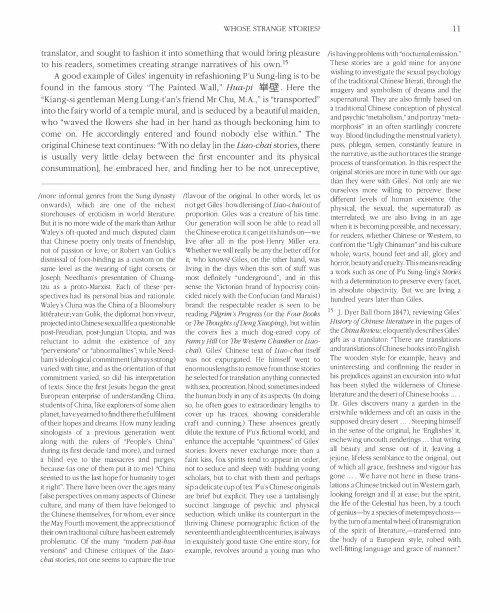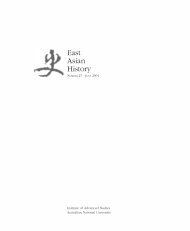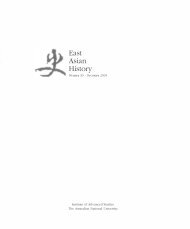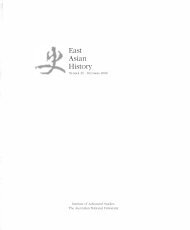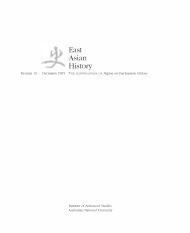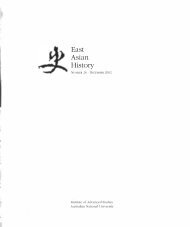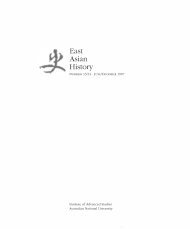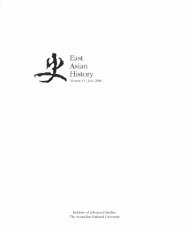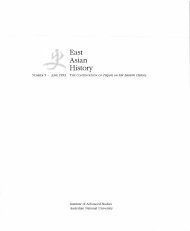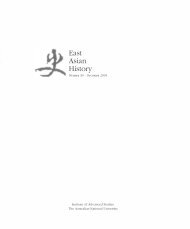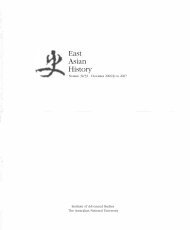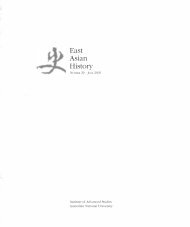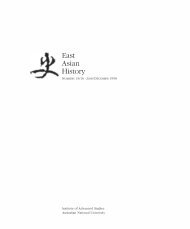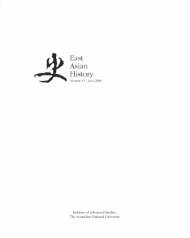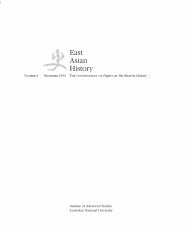Whose Strange Stories? P'u Sung-ling (1640 - East Asian History
Whose Strange Stories? P'u Sung-ling (1640 - East Asian History
Whose Strange Stories? P'u Sung-ling (1640 - East Asian History
You also want an ePaper? Increase the reach of your titles
YUMPU automatically turns print PDFs into web optimized ePapers that Google loves.
WHOSE STRANGE STORIES?<br />
translator, and sought to fashion it into something that would bring pleasure<br />
to his readers, sometimes creating strange narratives of his own. IS<br />
A good example of Giles' ingenuity in refashioning <strong>P'u</strong> <strong>Sung</strong>-<strong>ling</strong> is to be<br />
found in the famous story "The Painted Wall," Hua-pi ¥m:. Here the<br />
"Kiang-si gentleman Meng Lung-t'an's friend Mr Chu, M.A.," is "transported"<br />
into the fairy world of a temple mural, and is seduced by a beautiful maiden,<br />
who "waved the flowers she had in her hand as though beckoning him to<br />
come on. He accordingly entered and found nobody else within." The<br />
original Chinese text continues: "With no delay [in the Liao-chai stories, there<br />
is usually very little delay between the first encounter and its physical<br />
consummation], he embraced her, and finding her to be not unreceptive,<br />
Imore informal genres from the <strong>Sung</strong> dynasty<br />
onwards), which are one of the richest<br />
storehouses of eroticism in world literature.<br />
But it is no more wide of the mark than Arthur<br />
Waley's oft-quoted and much disputed claim<br />
that Chinese poetry only treats of friendship,<br />
not of passion or love; or Robert van Gulik's<br />
dismissal of foot-binding as a custom on the<br />
same level as the wearing of tight corsets; or<br />
Joseph Needham's presentation of Chuangtzu<br />
as a proto-Marxist. Each of these perspectives<br />
had its personal bias and rationale,<br />
Waley's China was the China of a Bloomsbury<br />
litterateur; van Gulik, the diplomat bon viveur,<br />
projected into Chinese sexual life a questionable<br />
post-Freudian, post-Jungian Utopia, and was<br />
reluctant to admit the existence of any<br />
"perversions" or "abnormalities"; while Needham's<br />
ideological commitment (always strong)<br />
varied with time, and as the orientation of that<br />
commitment varied, so did his interpretation<br />
of texts. Since the first Jesuits began the great<br />
European enterprise of understanding China,<br />
students of China, like explorers of some alien<br />
planet, have yearned to find there the fulfilment<br />
of their hopes and dreams, How many leading<br />
sinologists of a previous generation went<br />
along with the rulers of "People's China"<br />
during its first decade (and more), and turned<br />
a blind eye to the massacres and purges,<br />
because (as one of them put it to me) "China<br />
seemed to us the last hope for humanity to get<br />
it right". There have been over the ages many<br />
false perspectives on many aspects of Chinese<br />
culture, and many of them have belonged to<br />
the Chinese themselves, for whom, ever since<br />
the May Fourth movement, the appreciation of<br />
their own traditional culture has been extremely<br />
problematic. Of the many "modern pai-hua<br />
versions" and Chinese critiques of the Liaochai<br />
stories, not one seems to capture the true<br />
Iflavour of the original. In other words, let us<br />
not get Giles' bowdlerising of Liao-chai out of<br />
proportion. Giles was a creature of his time.<br />
Our generation will soon be able to read all<br />
the Chinese erotica it can get its hands on-we<br />
live after all in the post-Henry Miller era.<br />
Whether we will really be any the better off for<br />
it, who knows' Giles, on the other hand, was<br />
living in the days when this sort of stuff was<br />
most definitely "underground", and in this<br />
sense the Victorian brand of hypocrisy coincided<br />
nicely with the Confucian (and Marxist)<br />
brand: the respectable reader is seen to be<br />
reading Pilgrim 's Progress (or the Four Books<br />
or The Thoughts of Deng Xiaoping), but within<br />
the covers lies a much dog-eared copy of<br />
Fanny Hill (or The Western Chamber or LiaochaO.<br />
Giles' Chinese text of Liao-chai itself<br />
was not expurgated, He himself went to<br />
enormous lengths to remove from those stories<br />
he selected for translation anything connected<br />
with sex, procreation, blood, sometimes indeed<br />
the human body in any of its aspects. (In doing<br />
so, he often goes to extraordinary lengths to<br />
cover up his traces, showing considerable<br />
craft and cunning.) These absences greatly<br />
dilute the texture of <strong>P'u</strong>'s fictional world, and<br />
enhance the acceptable "quaintness" of Giles'<br />
stories: lovers never exchange more than a<br />
faint kiss, fox spirits tend to appear in order,<br />
not to seduce and sleep with budding young<br />
scholars, but to chat with them and perhaps<br />
sip a delicate cup of tea, <strong>P'u</strong>'s Chinese originals<br />
are brief but explicit. They use a tantalisingly<br />
succinct language of psychic and physical<br />
seduction, which unlike its counterpart in the<br />
thriving Chinese pornographic fiction of the<br />
seventeenth and eighteenth centuries, is always<br />
in exquisitely good taste. One entire story, for<br />
example, revolves around a young man who<br />
11<br />
lis having problems with "nocturnal emission,"<br />
These stories are a gold mine for anyone<br />
wishing to investigate the sexual psychology<br />
of the traditional Chinese literati, through the<br />
imagery and symbolism of dreams and the<br />
supernatural. They are also firmly based on<br />
a traditional Chinese conception of physical<br />
and psychic "metabolism," and portray "metamorphosis"<br />
in an often start<strong>ling</strong>ly concrete<br />
way, Blood (including the menstrual variety),<br />
puss, phlegm, semen, constantly feature in<br />
the narrative, as the author traces the strange<br />
process of transformation. In this respect the<br />
original stories are more in tune with our age<br />
than they were with Giles'. Not only are we<br />
ourselves more wil<strong>ling</strong> to perceive these<br />
different levels of human existence (the<br />
physical, the sexual, the supernatural) as<br />
interrelated; we are also living in an age<br />
when it is becoming possible, and necessary,<br />
for readers, whether Chinese or Western, to<br />
confront the "Ugly Chinaman" and his culture<br />
whole, warts, bound feet and all, glory and<br />
horror, beauty and cruelty. This means reading<br />
a work such as one of <strong>P'u</strong> <strong>Sung</strong>-<strong>ling</strong>'s <strong>Stories</strong><br />
with a determination to preserve every facet,<br />
in absolute objectivity. But we are living a<br />
hundred years later than Giles.<br />
15 J. Dyer Ball (born 1847), reviewing Giles'<br />
<strong>History</strong> of Chinese literature in the pages of<br />
the China Review, eloquently describes Giles'<br />
gift as a translator: "There are translations<br />
and translations of Chinese books into English.<br />
The wooden style for example, heavy and<br />
uninteresting, and confirming the reader in<br />
his prejudices against an excursion into what<br />
has been styled the wilderness of Chinese<br />
literature and the desert of Chinese books ,<br />
Dr. Giles discovers many a garden in the<br />
erstwhile wilderness and oft an oasis in the<br />
supposed dreary desert ., .. Steeping himself<br />
in the sense of the original, he 'Englishes' it,<br />
eschewing uncouth renderings .. , that wring<br />
all beauty and sense out of it, leaving a<br />
jejune, lifeless semblance to the original, out<br />
of which all grace, freshness and vigour has<br />
gone , .. . We have not here in these translations<br />
a Chinese tricked out in Western garb,<br />
looking foreign and ill at ease; but the spirit,<br />
the life of the Celestial has been, by a touch<br />
of genius-by a species of metempsychosisby<br />
the turn of a mental wheel of transmigration<br />
of the spirit of literature,-transferred into<br />
the body of a European style, robed with<br />
well-fitting language and grace of manner."


